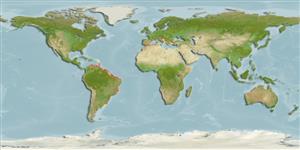Ikan bertulang rawan (sharks and rays) >
Carcharhiniformes (Ground sharks) >
Sphyrnidae (Hammerhead, bonnethead, or scoophead sharks)
Etymology: Sphyrna: Probable misspelling of sphyra (Gr.), hammer, referring to their hammer-shaped heads (See ETYFish); tudes: Latin for hammer, referring to its hammer-shaped head (See ETYFish).
More on author: Valenciennes.
Environment: milieu / climate zone / depth range / distribution range
Ekologi
laut bentopelagis, usually ? - 12 m (Ref. 244). Subtropical; 46°N - 57°S, 73°W - 37°E (Ref. 244)
Southwest Atlantic: Venezuela to Argentina (Ref. 58839). Also Mediterranean Sea and Eastern Pacific (Ref. 7251).
Size / Weight / umur
Maturity: Lm ? range ? - ? cm
Max length : 134 cm TL jantan/; (Ref. 244); 148.0 cm TL (female)
A little-known inshore shark of the continental shelf, found down to at least 12 m depth. Feeds on small bony fishes, including sea catfish and grunts, but also newborn scalloped hammerheads, swimming crabs, squids, and shrimp. Viviparous with a yolk-sac placenta; number of young probably 6 to 9 per litter (Ref. 244).
Viviparous, with yolk-sac plazenta; number of young probably 6 - 9 per litter. Size at birth about 30 cm.
Compagno, L.J.V., 1984. FAO Species Catalogue. Vol. 4. Sharks of the world. An annotated and illustrated catalogue of shark species known to date. Part 2 - Carcharhiniformes. FAO Fish. Synop. 125(4/2):251-655. Rome: FAO. (Ref. 244)
Status IUCN Red List (Ref. 130435: Version 2024-1)
ancaman kepada manusia
Harmless
penggunaan manusia
Perikanan: perikanan swasembada
Alat, peralatan
laporan khas
muat turun XML
Sumber internet
Estimates based on models
Preferred temperature (Ref.
123201): 17.6 - 27.8, mean 21.1 °C (based on 613 cells).
Phylogenetic diversity index (Ref.
82804): PD
50 = 0.5029 [Uniqueness, from 0.5 = low to 2.0 = high].
Bayesian length-weight: a=0.00347 (0.00153 - 0.00788), b=3.12 (2.93 - 3.31), in cm total length, based on LWR estimates for this (Sub)family-body shape (Ref.
93245).
Trophic level (Ref.
69278): 3.6 ±0.4 se; based on diet studies.
Daya lenting (Ref.
120179): sangat rendah, Waktu penggandaan populasi minimum lebih dari 14 tahun (Fec=6).
Fishing Vulnerability (Ref.
59153): Very high vulnerability (89 of 100).
